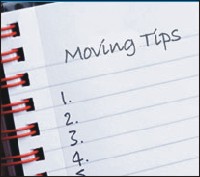FAQs
Insist on keeping things together when you or the movers are packing boxes. Keep bookends with books, light bulbs with lamps, and extension cords with appliances.
1.Pack ahead
2.Consolidate cleaning supplies (if you will need old place after move out)
3.Use your luggage (with clothing, paper, towels)
4.Safeguard valued items (gold, antiques etc.) you can buy additional insurance on this box or take it with you
5.Keep important papers with you (bills, birth certificates etc.) try to keep all paperwork with you
6.Personal boxes (personal belongings you will need on new place at the arrival)
Corrects & Responsibilities When You Want to Move:
1. Movers must give written estimates. (optional)
2. Movers may give binding estimates. (optional)
3. Non-binding estimates are not always accurate; actual charges may exceed the estimate. (usually 10% + or – from estimate)
4. If your mover provides you (or someone representing you) with any partially complete document for your signature, you should verify the document is as complete as possible before signing it. Make sure the document contains all relevant shipping information, except the actual shipment weight and any other information necessary to determine the final charges for all services performed.
5. You may request from your mover the availability of guaranteed pickup and delivery dates. (on local moves usually same day)
6. Be sure you understand the mover’s responsibility for loss or damage, and request an explanation of the difference between valuation and actual insurance. (Basic Carrier Liability is free and it is always included in the estimate)
7. You have the right to be present each time your shipment is weighed.
8. You may request a re-weigh of your shipment. (for long distance moves)
9. If you agree to move under a non-binding estimate, you should confirm with your mover in writing the method of payment at delivery as cash, certified check, money order, cashier’s check, or credit card.
10. Movers must offer a dispute settlement program as an alternative means of settling loss or damage claims. Ask your mover for details. (The Arbitration Program or ARBITRATION – Disputed Loss and Damage Claims) First file a claim with your mover…
11. You should ask the person you speak to whether he or she works for the actual mover or a household goods broker. A household goods broker only arranges for the transportation. A household goods broker must not represent its self as a mover. A household goods broker does not own trucks of it’s own. The broker is required to find an authorized mover to provide the transportation. You should know that a household goods broker generally has no authority to provide you an estimate on behalf of a specific mover. If a household goods broker provides you an estimate, it may not be binding on the actual mover and you may have to pay the actual charges the mover assesses. A household goods broker is not responsible for loss or damage.
12. You may request complaint information about movers from FMCSA under the Freedom of Information Act (FOIA). You may be assessed a fee to obtain this information. See 49 CFR Part 7 for the schedule of fees.
13. You should seek estimates from at least three different movers. You should not disclose any information to the different movers about their competitors, as it may affect the accuracy of their estimates.
Before you start write everything down and create some type of record keeping system. You can make a spreadsheet and prepare computer labels or you can create a simple hand written notebook. The important thing is to document all of the items you place in a box, put numbers on the boxes you pack, and record the contents on your list.
 We offer Storage services and Promotions for our clients. Please call us for the quote and availability Long and Short term storage options. Climate controlled for all your Fine Art and Antique belongings. Get 1 Month Free with 3 months storage agreement
We offer Storage services and Promotions for our clients. Please call us for the quote and availability Long and Short term storage options. Climate controlled for all your Fine Art and Antique belongings. Get 1 Month Free with 3 months storage agreement